As privacy laws become stricter, achieving and maintaining compliance with the major data privacy regulations, like the General Data Protection Regulation (GDPR), and large tech platforms’ requirements resulting from the Digital Markets Act (DMA), is essential for marketers who want to gain in-depth insights, deliver personalized experiences, and win their customers’ trust.
To help you choose cookie management software that will meet your data privacy needs in 2025 and beyond, we’ve curated a list of tools that can deepen your understanding of user behavior while simultaneously navigating the complexities of major data privacy laws.
Cookie management software platforms
| Software | Key feature | Recommended for | Price* |
|---|---|---|---|
| Usercentrics | In-depth analytics and reporting: Gain deep insights into user interactions and consent rates to drive optimization and informed decision-making | SMBs to enterprise | 14-day free trial From USD 8/month/domain |
| Cookie Information | Daily and weekly scans: Get regular updates about all the cookies on your website. | EU-based businesses | 14-day free trialFrom EUR 19/month |
| CookieFirst | Re-consent: Increase opt-in rates by setting goals for returning visitors. | Small companies and agencies | 14-day free trialLimited free plan availableFrom EUR 9/month |
| CookieScript | Cookie banner sharing: Invite additional users — like clients — to view banner information, statistics, and consents. | Agencies | 7-day money-back guarantee Limited free plan available From EUR 8/month |
| CookieYes | WordPress plugin: Add CookieYes to your WordPress website in just a few clicks with the purpose-built plugin. | Small to mid-size businesses | 14-day free trialLimited free plan availableFrom USD 10/month |
| Axeptio | Conversational UI: Incorporate friendly characters into cookie banners to create empathy and goodwill with users. | SMBs, agencies, EU publishers | Limited free plan available |
| Complianz | Easy wizard: Get step by step guidance when setting Complianz up on your website. | Businesses and agencies using WordPress | 30-day money-back guarantee From USD 59/month |
| Termly | Cookie Policy Generator: Generate one free cookie policy for your website. | Small businesses, solopreneurs, and US-focused sites | Limited free plan available From EUR 9.50/month |
*As of August 2025
Why should you keep track of cookies?
Tracking cookies enable you to collect data about users — including visitor demographics, preferences, and behavior patterns — so that you can tailor your website content to enhance the user experience and increase engagement.
Read about tracking cookies now
It’s not all about improving performance, though. First- and third-party cookies are a cornerstone of online advertising. However, as a data controller — the party responsible for the collection and processing of personal data — you must get explicit and prior consent from data subjects (visitors whose personal data is being collected by cookies) before loading any tracking cookies. This is a requirement for most of the major data privacy regulations.
Failing to meet the requirements of these laws can lead to hefty fines, damage your business’s reputation, and potentially limit future opportunities for growth.
This is where cookie consent management software comes in. These tools make it easy to tell your website and app visitors what types of tracking software are present on your website, to offer them clear and granular options for cookie consent, and finally, to keep a detailed record of their consent, as required by regulations such as the GDPR.
8 of the best cookie audit tool options
We assessed eight of the top cookie audit tool options on the market. We scoured user reviews and considered their key features for managing cookie consent, options for customization, and breadth of integrations and supported languages, etc.
1. Usercentrics
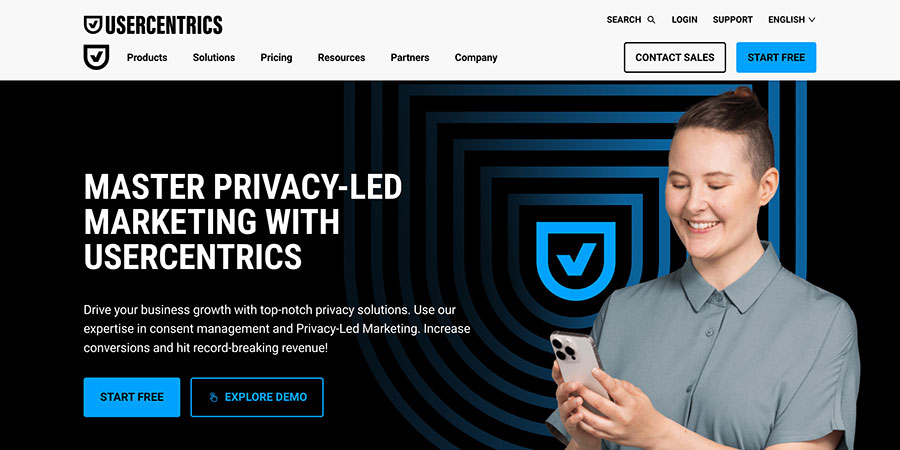
An all-in-one consent management platform (CMP), Usercentrics helps businesses manage cookies and GDPR compliance. Trusted by more than 2.2 million websites and apps in 195 countries, the platform is a market leader in solutions for data privacy and privacy-led marketing.
Usercentrics’ cookie detection, categorization, and autoblocking functionality helps enable GDPR cookie consent as well as adherence to other major privacy regulations like the Digital Markets Act (DMA) requirements handed down by designated “gatekeeper” companies, and California Consumer Privacy Act (CCPA).
Usercentrics CMP also comes with the latest version of Google Consent Mode and the IAB TCF 2.2 integrated, helping meet Google’s latest requirements for publishers and advertisers.
Key features
- Cross-domain and cross-device consent: Signal user consent across your websites and apps to improve the user experience, all from one place.
- Granular consent management: Give users the option to accept or reject a range of different cookies on one notice with just a few clicks.
- Robust analytics and reporting: Get in-depth insights about user behavior and banner interactions to drive informed decision-making to optimize opt-in rates.
- Full UI customization: Tailor the look and feel of your cookie banners and other privacy notices to match your brand identity.
- Geolocation: Serve users cookie notices with the appropriate language and regulation-specific features based on the country or region from which they’re visiting your site.
Usercentrics pricing
Usercentrics offers a free 14-day trial, after which users can sign up for one of the following paid plans.
- Starter: USD 60/month for up to 50,000 sessions
- Advanced: USD 175–1,150/month for 50,000+ sessions
- Premium: Custom pricing
| Consent records stored on EU-based servers | Analytics data only available for 90 days |
| Automatically blocks third-party cookies | |
| A/B testing |

Read about shopify cookie banner now
2. Cookie Information
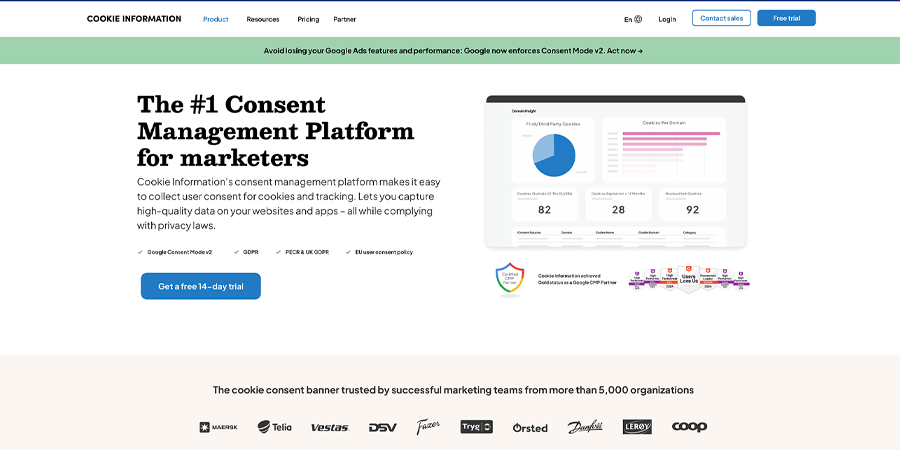
Cookie Information has a stated mission to help businesses collect valid consents to comply with privacy laws and build trust with their customers. The platform offers consent management for both websites and mobile apps but doesn’t offer A/B testing.
Key features
- Daily and weekly scans: Get regular updates about all the cookies present on your website.
- Free trial: Try Cookie Information for free on your website or app for 14 days.
- Customer Data Platform: Create customer profiles and segment them into audiences to personalize your client journey.
Pricing
- Essential: From EUR 15/month, per domain
- Professional: From EUR 45/month, per domain
| Plugin for WordPress available | No A/B testing |
| Detailed consent rate insights | |
| Google Certified CMP partner |
3. CookieFirst
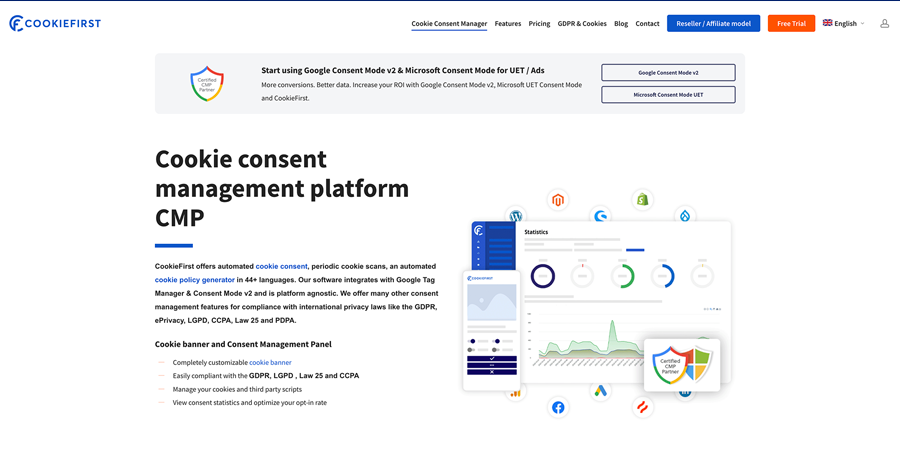
CookieFirst advertises a quick and easy signup to get users on their way to achieving GDPR compliance in minutes. Then the tool will scan your site for first- and third-party cookies, after which you can set up your settings and customize your cookie banner with just a few clicks. There is a free version, but you’ll only get a cookie banner in one language along with a one-off cookie scan.
Key features
- Re-consent: Increase opt-in rates by setting goals for returning visitors.
- Consent Audit Trail: Store user consents in an anonymous, encrypted database, including details of any changes in consent permissions.
- Cookie Policy: Create and edit an auto-generated cookie policy.
Read about cookie policy now
Pricing
- Free: EUR 0
- Basic: EUR 9/month or EUR 99/year
- Plus: EUR 19/month or EUR 209/year
- Enterprise: Custom pricing
| Free tier available | No app consent solution |
| Google Consent Mode and Google Tag Manager integrations | |
| 44+ languages supported |
4. CookieScript
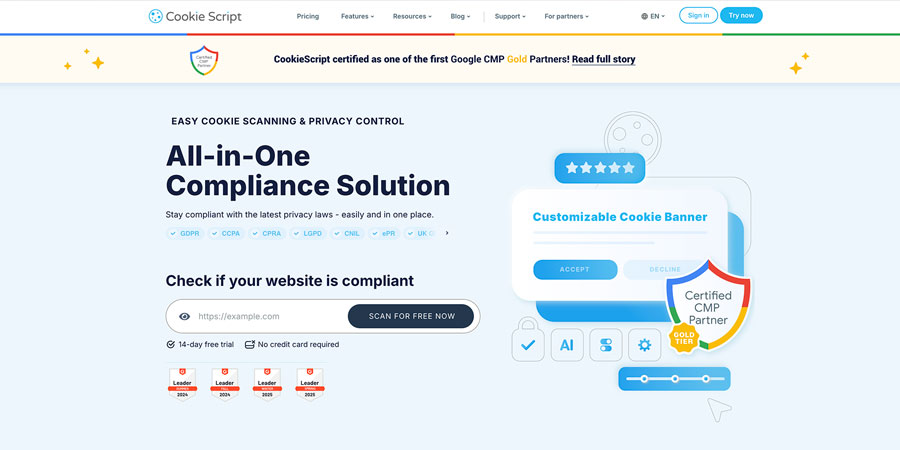
CookieScript is a self-hosted CMP with geotargeting that works across 250 countries and 50 US states. While the platform does store all consent records on servers in the EU, users will need to sign up for its Plus tier for access to all of its GDPR features, such as record-keeping for user consents and IAB TCF 2.2 integration.
Key features
- Cookie banner sharing: Invite additional users — like clients — to view banner information, statistics, and consents.
- Integrations: Compatible with Google Tag Manager, WordPress, Wix, Shopify, and other popular platforms.
- Cookie scanner: Scan your site for cookies and access an in-depth cookie declaration report, complete with categorized cookies.
Read about wix cookie banner now
Pricing
CookieScript’s pricing is determined by the number of domains that the CMP is added to. Subscriptions are priced per month, but you’ll be locked into a year-long contract.
Pricing for one to two domains is as follows:
- Free: EUR 0/month
- Lite: EUR 8/month
- Standard: EUR 15/month
- Plus: EUR 19/month
| All data stored on EU servers | All GDPR tools only available on the most expensive plan |
| Ability to manage multiple websites from one dashboard | |
| Transparent, per-domain pricing |
5. CookieYes
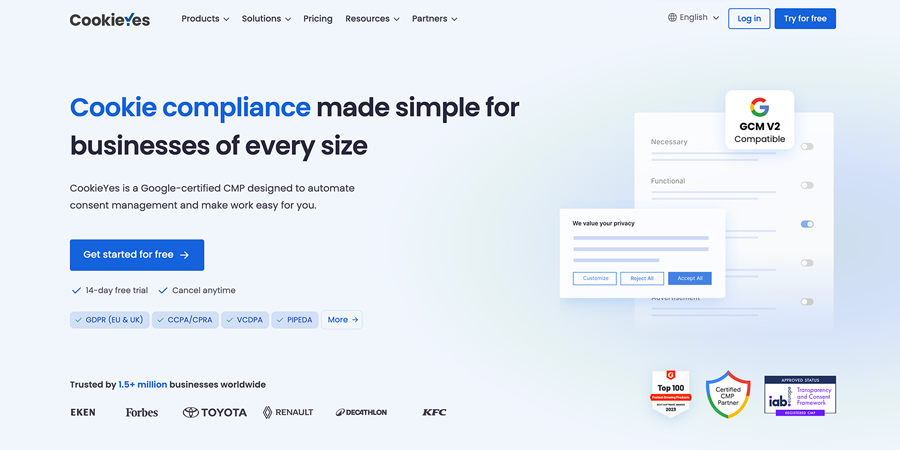
CookieYes states that the company is trusted by more than 1.5 million businesses worldwide. After starting out as a WordPress plugin, their product has since become a fully fledged cookie consent solution. Despite its range of features, essentials like Global Privacy Control and geotargeting are only available on its two most expensive plans.
Key features
- WordPress plugin: Add CookieYes to your WordPress website in just a few clicks with the purpose-built plugin.
- Auto translation: Display banners in one of 30+ languages based on users’ default browser language.
- Cookie auto-blocking: Support users’ Do Not Track (DNT) browser settings even if they provide consent.
Pricing
CookieYes offers a 14-day free trial, after which users can sign up for a month-to-month or annual subscription. Plan prices are for a single domain:
- Free: USD 0
- Basic: USD 10/month or USD 100/year
- Pro: USD 20/month or USD 200/year
- Ultimate: USD 40/month or USD 400/year
| Available as a plugin for all major CMS | All plans limit page scans |
| Multilingual banner, in 30+ languages | |
| Customer support is responsive (G2 users report) |
6. Axeptio
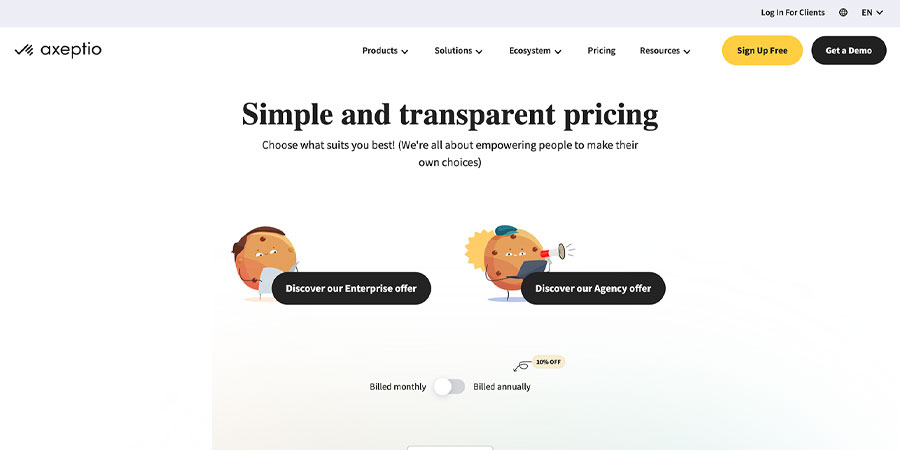
Axeptio brings some levity to cookie consent management branding itself as fun and approachable, with fresh UX. The platform is designed to be a low-code consent management suite, making it perfect for teams with limited tech expertise or resources.
Key features
- Conversational UI: Incorporate friendly characters into cookie banners to create empathy and goodwill with users.
- Native Mobile SDKs: Build cookie banners for Android and iOS apps with ease.
- Shake: Scan third-party vendors on your website to understand whether your banners meet data privacy requirements.
Pricing
- Free: USD 0/month
- Small: USD 29/month or USD 313/year
- Medium: USD 69/month or USD 745/year
- Large: USD 129/month or USD 1,393/year
- Enterprise: Custom pricing
- Agency: Custom pricing
| Single widget to manage all consents | Cookie management only available in the Enterprise and Agency plans |
| Supports 25 languages | |
| Live training and webinars |
7. Complianz
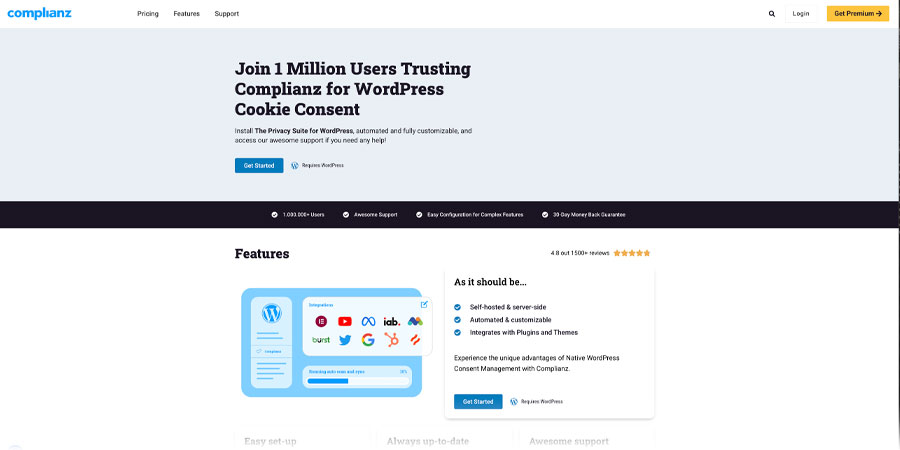
Complianz is a native privacy suite for WordPress websites. Thanks to a setup wizard, it’s easy to set up. It also includes over 250 service and plugin integrations. While it does come with a cookie scanner, Complianz users have reported that it isn’t always accurate and doesn’t recognize third-party cookies.
Key features
- Easy wizard: Get step by step guidance when setting Complianz up on your WordPress website.
- Script Center: Add necessary documents to your website without the need for coding.
- Privacy statements for children: Request parental consent for the collection of data from website or app visitors under the age of 13.
Pricing
Complianz plans are priced per year.
- Personal: USD 59 for 1 website
- Professional: USD 150 for 5 websites
- Agency: USD 359 for 25 websites
| Includes setup wizard | Self-hosted only |
| 30-day money back guarantee | |
| WCAG and ADA compliant |
8. Termly
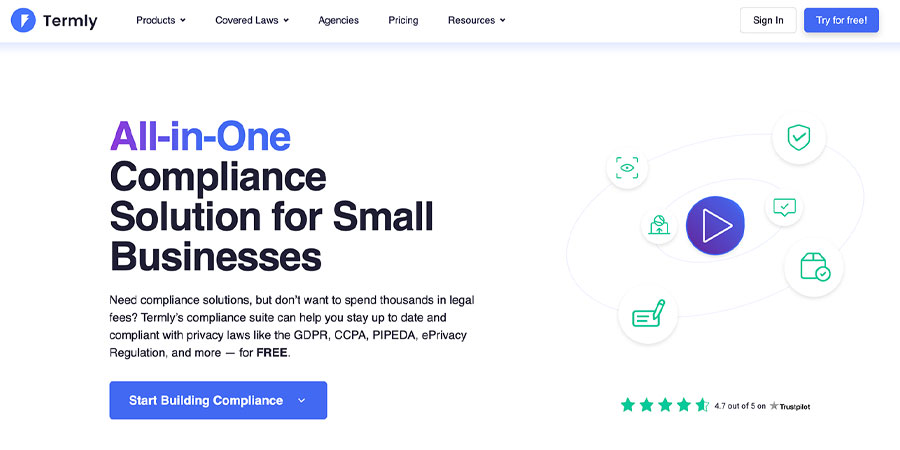
Designed with small businesses in mind, Termly is an out of the box compliance solution that aims to help users stay up to date with major data privacy laws in more than 25 regions. The platform’s pricing is competitive, but it lacks some features and functions that larger businesses would need for it to be useful.
Key features
- Do Not Sell or Share Links: Add links to your cookie banner to give users complete control over their personal data.
- Automatic Consent Logs: Collect and store user consent in a centralized log that can be accessed via the dashboard.
- Cookie Policy Generator: Generate one free cookie policy for your website.
Pricing
- Free: USD 0 for 1 user and 10,000 banner views
- Starter: USD 10/month, billed annually for 5 users and 100,000 banner views
- Pro: USD 15/month, billed annually for unlimited users and banner views
- Agency: Custom pricing and configuration
| Supports IAB TCF 2.2 and Google Consent Mode | Only one domain included in the license |
| Automatic policy generation | |
| Supports compliance with data privacy laws in 25+ regions |
Must-have features for cookie management software
Choosing the right cookie management software is essential for staying compliant and building trust with your users. Here are the must-have features to look for:
- Compliance with global data privacy regulations: Meets all of the requirements on the GDPR cookie checklist as well as those for major regulations such as the ePrivacy Directive, CCPA, and other laws.
- Promotes transparency and active, informed consent: Enhances transparency and active user consent, by enabling users to easily opt in or out, or withdraw their consent.
- Provides more control for users: Empowers users with options to manage their cookie preferences at a granular level.
- Google certified: Ensures compatibility and reliable consent signaling with Google Consent Mode v2.
- Cookie scanning: Identifies and catalogs all tracking cookies, including third-party cookies, and informs users about any third-party tracking taking place.
Find the best cookie audit tool tracking
The right cookie audit tool can help you to achieve compliance with the major data privacy laws without affecting the quantity or quality of insights you’re able to gain from tracking user behavior.
Usercentrics helps you ensure quality marketing insights and maintain personalization — while respecting user privacy and building trust.
The Usercentrics CMP is compatible with all your favorite marketing tools, enabling you to offer users a personalized experience on every platform and achieve privacy compliance with the GDPR, ePrivacy Directive, and Google’s EU user consent policy.
Read about wordpress cookie consent now
The information presented in this article is provided for educational purposes only. Engaging qualified legal counsel or privacy specialists regarding data privacy and protection issues and operations when evaluating solutions is always recommended. This information is accurate based on these publicly available sources as of the date of publication. Details about products, features, pricing, etc. may change over time.



